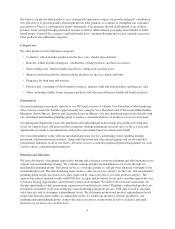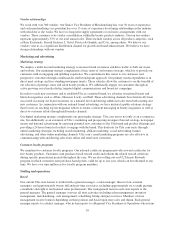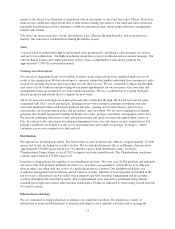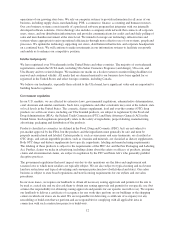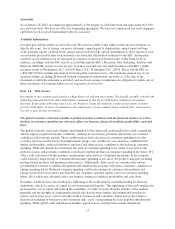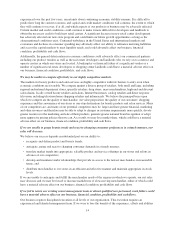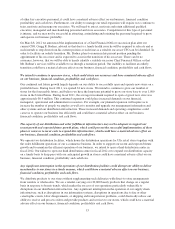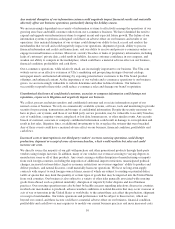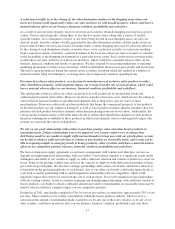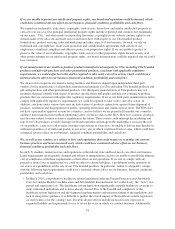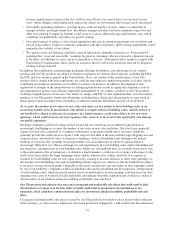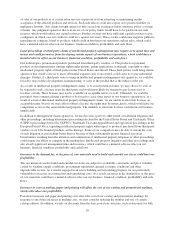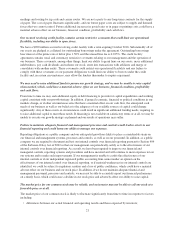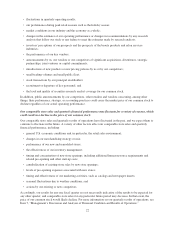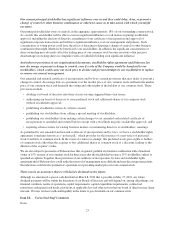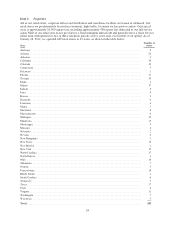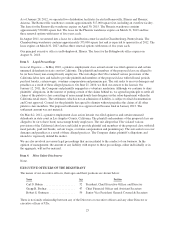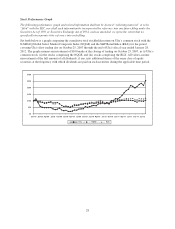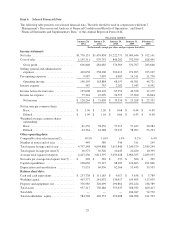Ulta 2011 Annual Report Download - page 23
Download and view the complete annual report
Please find page 23 of the 2011 Ulta annual report below. You can navigate through the pages in the report by either clicking on the pages listed below, or by using the keyword search tool below to find specific information within the annual report.because significant provisions of the Acts will become effective on various dates over the next several
years, future changes could significantly impact any effects on our business that we previously anticipated.
‰Our rapidly expanding workforce, growing in pace with our number of stores, makes us vulnerable to
changes in labor and employment laws. In addition, changes in federal and state minimum wage laws and
other laws relating to employee benefits could cause us to incur additional wage and benefits costs, which
could hurt our profitability and affect our growth strategy.
‰Our salon business is subject to state board regulations and state licensing requirements for our stylists and
our salon procedures. Failure to maintain compliance with these regulatory and licensing requirements could
jeopardize the viability of our salons.
‰We operate stores in California, which has enacted legislation commonly referred to as “Proposition 65”
requiring that “clear and reasonable” warnings be given to consumers who are exposed to chemicals known
to the State of California to cause cancer or reproductive toxicity. Although we have sought to comply with
Proposition 65 requirements, there can be no assurance that we will not be adversely affected by litigation
relating to Proposition 65.
In addition, the formulation, manufacturing, packaging, labeling, distribution, sale and storage of our vendors’
products and our Ulta products are subject to extensive regulation by various federal agencies, including the FDA,
the FTC and state attorneys general in the United States. If we, our vendors or the manufacturers of our Ulta
products fail to comply with those regulations, we could become subject to significant penalties or claims, which
could harm our results of operations or our ability to conduct our business. In addition, the adoption of new
regulations or changes in the interpretations of existing regulations may result in significant compliance costs or
discontinuation of product sales and may impair the marketability of our vendors’ products or our Ulta products,
resulting in significant loss of net sales. Our failure to comply with FTC or state regulations that cover our vendors’
products or our Ulta product claims and advertising, including direct claims and advertising by us, may result in
enforcement actions and imposition of penalties or otherwise harm the distribution and sale of our products.
As we grow the number of our stores in new cities and states, we are subject to local building codes in an
increasing number of local jurisdictions. Our failure to comply with local building codes, and the failure of
our landlords to obtain certificates of occupancy in a timely manner, could cause delays in our new store
openings, which could increase our store opening costs, cause us to incur lost sales and profits, and damage
our public reputation.
Ensuring compliance with local zoning and real estate land use restrictions across numerous jurisdictions is
increasingly challenging as we grow the number of our stores in new cities and states. Our store leases generally
require us to provide a certificate of occupancy with respect to the interior build-out of our stores (landlords
generally provide the certificate of occupancy with respect to the shell of the store and the larger shopping area and
common areas), and while we strive to remain in compliance with local building codes relating to the interior
buildout of our stores, the constantly increasing number of local jurisdictions in which we operate makes it
increasingly difficult to stay abreast of changes in, and requirements of, local building codes and local building and
fire inspectors’ interpretations of such building codes. Moreover, our landlords have occasionally been unable, due
to the requirements of local zoning laws, to obtain in a timely manner a certificate of occupancy with respect to the
shell of our stores and/or the larger shopping centers and/or common areas (which certificate of occupancy is
required by local building codes for us to open our store), causing us in some instances to delay store openings. As
the number of local building codes and local building and fire inspectors to which we and our landlords are subject
to increases, we may be increasingly vulnerable to increased construction costs and delays in store openings caused
by our or our landlords’ compliance with local building codes and local building and fire inspectors’ interpretations
of such building codes, which increased construction costs and/or delays in store openings could increase our store
opening costs, cause us to incur lost sales and profits, and damage our public reputation and could have a material
adverse effect on our business, financial condition, profitability and cash flows.
Our Ulta products and salon services may cause unexpected and undesirable side effects that could result in their
discontinuance or expose us to lawsuits, either of which could result in unexpected costs and damage to our
reputation, which could have a material adverse effect on our business, financial condition, profitability and cash
flows.
Unexpected and undesirable side effects caused by our Ulta products for which we have not provided sufficient
label warnings, or salon services which may have been performed negligently, could result in the discontinuance
19


